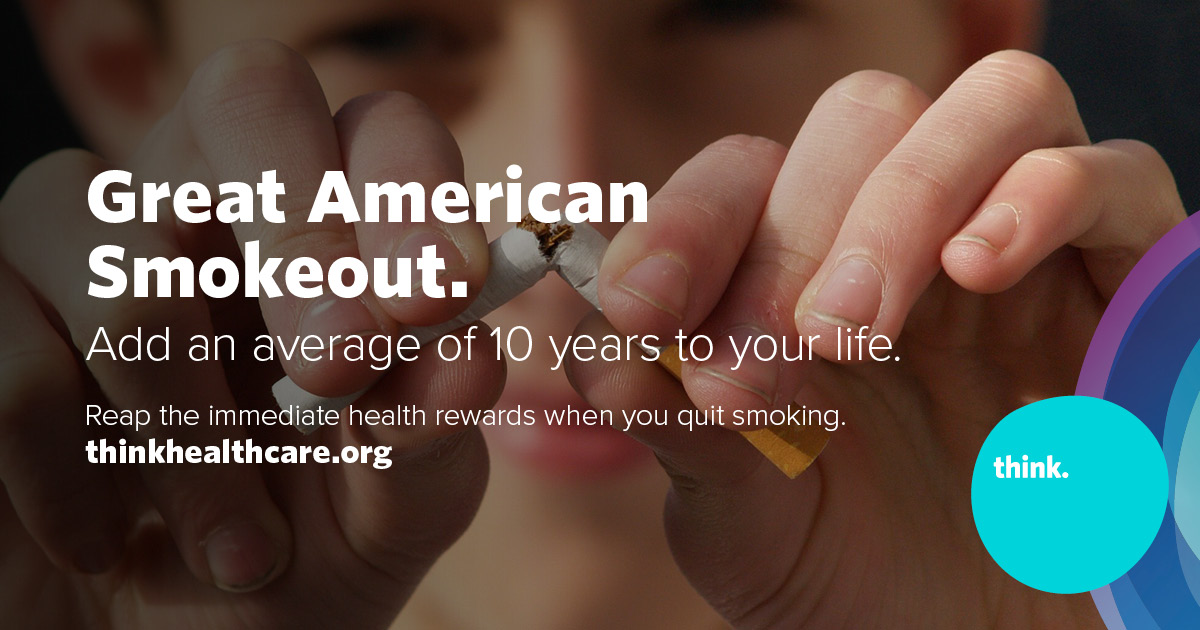Because quitting smoking can be a difficult challenge, people who smoke need a plan and plenty of support. To help, the American Cancer Society designates every third Thursday in November as the Great American Smokeout, a time to commit to a smoke-free life. On November 17, 2022, thousands of smokers nationwide will join together in a positive step toward a healthier life and reduce their cancer risk.
Cigarette smoking is the leading cause of preventable disease and death in the world. In the United States, 20% of deaths each year come from tobacco use. The American Cancer Society reports that about 34 million Americans smoke cigarettes. Millions more, particularly teens and young adults, use e-cigarettes and vaping devices that contain nicotine, the same addictive drug in cigarettes, cigars and other tobacco products.
What makes tobacco products harmful?
Thousands of chemicals—at least 70 known to cause cancer—are found in tobacco smoke. These cancer-causing chemicals called carcinogens include nicotine, hydrogen cyanide, arsenic, lead, formaldehyde and even radioactive elements. Most of the toxic substances in cigarettes, cigars and pipe tobacco come from burning the tobacco leaves themselves, not from preservatives or additives used to enhance flavor.
How does smoking affect overall health?
Smoking harms a person’s airways and small air sacs in the lungs. This damage begins soon after someone starts smoking and increases over time. Smoking can cause severe long-term, lung diseases such as chronic obstructive pulmonary disease (COPD). Smoking also exacerbates lung diseases such as asthma and lung infections including pneumonia and tuberculosis.
Smoking also heightens cancer risks and increases damage to nearly every organ in the body including lungs, heart, blood vessels, mouth, esophagus, skin, eyes and reproductive organs.
In the United States, 30% of all cancer deaths are attributed to smoking and 80% of all lung cancer deaths. On average, people who smoke die about 10 years earlier than people who have never smoked.
How does second-hand smoke affect people?
Second-hand smoke is a blend of mainstream smoke exhaled by a smoker and sidestream smoke that comes from the lighted end of a cigarette, cigar, pipe or hookah. Exposure to another person’s smoke is called involuntary smoking or passive smoking. Breathing in second-hand smoke exposes a person to the same harmful chemicals as smokers.
Second-hand smoke causes lung cancer, even in individuals who have never smoked. Other medical evidence points to a second-hand smoke link to cancers of the larynx, throat, nasal sinuses and breast in adults. Mothers and babies exposed to second-hand smoke show a possible childhood cancer increase in lymphoma, leukemia and brain tumors.
Studies find that children whose parents smoke are more likely to cough, wheeze and experience shortness of breath. Children affected by second-hand smoke are more prone to illness including asthma, bronchitis, pneumonia and ear infections. In younger children, exposure to others’ smoke elevates the risk for sudden infant death syndrome (SIDS).
Health Benefits of Quitting Smoking
The sooner people stop smoking, the more they can reduce their risk for cancer and other diseases. Within a few minutes after a person stops smoking, the body starts to recover. After just 20 minutes from a last cigarette, a person’s heart rate and blood pressure drop. A few days later, the blood’s carbon monoxide levels return to normal. The American Cancer Society shares a chart of long-term health benefits from smoking cessation. This includes after 15 years of not smoking, a former smoker shares nearly the same risk of coronary heart disease as a nonsmoker.
Other more immediate rewards of quitting smoking are:
- You save money.
- Your breath, hair and clothes smell fresher.
- Your tastebuds enjoy more food flavors and textures.
- Your sense of smell returns to normal.
- Your teeth and fingernails stop yellowing.
- Your skin wrinkles less.
- Your dental and oral health improve.
What support is available for people who want to quit smoking?
At Think Whole Person Healthcare, we understand the intense cravings for nicotine products, and we are here to help not scold. No matter your age or how long you’ve been smoking, it is never too late to stop using tobacco.
Our team of physicians, nurses and clinical pharmacists work together on an individualized plan to help you quit smoking, not just on the Great American Smokeout day, but for the rest of your life. We come alongside you in getting ahead of smoking before it gets ahead of your daily health.
To evaluate and protect your lungs and respiratory function, we work directly with Nebraska Pulmonary Specialties who operates an outpatient clinic inside our main think facility. Our clinical pharmacists can manage the prescription medications designed to help you quit smoking and boost your chance of success.
The think knowledgeable and compassionate network of healthcare providers can also suggest local support groups and resources to help you stay consistent with your smoking recovery goals. In addition to the American Cancer Society, the American Lung Association is an invaluable resource for those who want to quick smoking and their family and friends who want to help.
LEARN MORE ABOUT HOW TO STOP SMOKING AND PROTECT YOUR OVERALL HEALTH
Think makes it easy to receive both preventative care and treatment for a wide range of health conditions. From that nagging cough to painful joints, our healthcare providers and specialists are committed to your lifelong health and well-being.
Our walk-in clinic treats anyone, even those who are not a think patient or do not have a primary care provider currently. To learn more about our comprehensive healthcare services, visit our Services page online and choose your own think medical professionals by visiting our Meet Your Doctor page.
